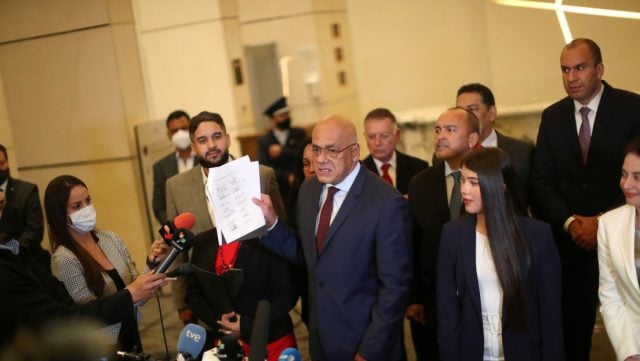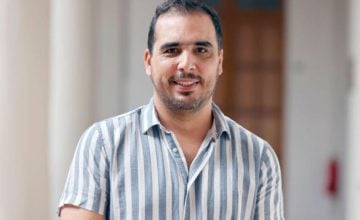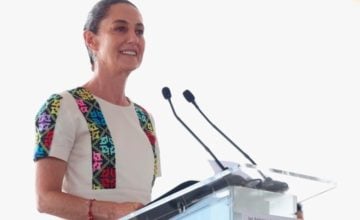The government of Venezuela and the radical opposition managed to finalize the first two agreements through a dialogue that has the Kingdom of Norway as a mediator and Mexico as the neutral headquarters of the talks.
The Venezuelan sociologist Ociel Alí López, explained in an article for RT, that although the memorandum of understanding signed by the government and the opposition in Mexico, in mid-August, could be seen as a kind of guideline paper with general proposals without points clearly defined, but the document signed this Monday between the parties, in the same city, already begins to outline concrete points of agreement on sensitive issues.
This is an important sign that shows progress towards political normalization in Venezuela and the change in attitude in the relations of both sides.
The idea of a ‘partial agreement’, as this document signed by the parties has been called, shows that a general agreement is not yet in sight, with which the two political tendencies assume a long process that no longer allows us to think about defenestration of the adversary, as was the case with the policies for the interim designed by the opposition, and which sought to make a clean sweep of the Chavismo, even with a foreign military intervention.
Gradual advances are the new strategy of the opposition. For this reason, the ‘mantra’ of the interim, according to which a step could not be taken until President Nicolás Maduro left the Government, is now a matter of the past. The opposition is currently governed by a new strategy of prolonged struggle and a return to the political-electoral path.
These concrete agreements show that, unlike on previous occasions – as in the dialogues in Dominican Republic and Barbados – the opposition does not want, or cannot, ‘kick the table’ and walk out.
People first
According to the signed document: «Convinced of the need to put the Venezuelan people at the center of attention», a «national social care table» has been created to try to serve vulnerable sectors of the country. This is an acknowledgment, which is also explicit on paper, of the consequences of the blockade and its impact on the civilian population.
The parties also agreed to work on health, food and vaccination, which implies building bridges with the Venezuelan popular sectors, which have been left out of the current political ‘confrontation’ despite being the main affected by the diatribe.
All the currents present in Mexico need that the Venezuelans, especially their followers and those who followed them in the past, to understand that what is happening is not the reconciliation between two elites that will not modify, in any way, their day-to-day hardships.
Therefore, the idea that haunts the heads of both delegations is to achieve ‘early victories’ to serve the people, especially in relation to the purchase of vaccines and medical supplies for the pandemic; something that has become complicated due to the financial blockade that prevented the government from paying the UN vaccine purchase mechanism (Covax).
The Venezuelan political conflict, intensified after the ‘self-swearing in’ of Guaidó, unlike others in which the population participates effusively, ended up throwing the majority of the population towards a position of disbelief in politics. The issue of abstention, to take just one example, reached impressive historical numbers. In a country that boasted about the very high turnout in the electoral processes, the people took refuge in trying to save their personal finances and got fed up with politics.
Therefore, this agreement is essential. Having started with social issues, and not political ones, is a recognition by professional politicians that they must rescue the dialogue with the Venezuelan people and, for this, the only way is to put it as a cornerstone of the work on the dialogue table facilitated by Norway.
Although the agreement does not only focus on the social.
An agreement on the Essequibo of Venezuela
One of the agreements signed by the parties has to do with agreeing to defend the Essequibo territory, which is in dispute with neighboring Guyana, sponsored by the United Kingdom.
During the Guaidó revolt, this point was important, since Guyana and its international allies, including the oil company Exxon Mobil, tried to advance in a resolution of the dispute contrary to the interests and the historic claim of Venezuela. Faced with this, the opposition politicians fell silent and the position of the «ambassador» of the interim office in London was quite close to the interests of the United Kingdom in this regard.
International actors took advantage of the situation to try to strip Venezuela of this territory and dismember it in parts, starting with the Essequibo.
So the clarification of the opposition regarding the protection of this territory is a point in favor of the defense of Venezuelan interests, which may have consequences with the British Government, one of the few that still recognizes Guaidó as president and who has more than a billion dollars in gold from the reserves of the Venezuelan State held in the vaults of its central bank.
And the political agreements for Venezuela?
It may seem strange that the partial agreement of this first round does not delve into the electoral conditions for the regional elections on November 21. A first reading of the signed document could lead us to think that it has been a ‘round’ of significant victories for the government and almost none for the opposition.
However, the mediators and the parties have already confirmed that a ‘second round’ will soon come, between September 24 and 27, where the issue of the justice system and the re-institutionalization of the country will be a priority, and in which the government will surely have to make important concessions.
Although the government has made important variations on how to approach the negotiations – such as allowing the return of exiles, allowing the use of the electoral card of the MUD (Table of Democratic Unity) and announcing the elimination of the protectorates (A sort of parallel governorates parallel in the states where the opposition wins) -, it is pending to allow opposition leaders, several of them seated at the table and who are disqualified, to participate as candidates in the mega-elections of November 21.
Although the possibility still exists, and it is to be considered, that several of these leaders remain disqualified if the opposition does not comply with part of its agreement, which is limited, above all, to pressuring its allies in the United States and Europe to somehow ‘soften’ the sanctions that, according to the document where they agree, have «overachieved» their objectives.
The opposition publishes a document on the agreements
The very fact that the opposition drafts and publishes a document on the negotiation process is an undeniable political advance.
Until now, the opposition has made all negotiation processes a kind of taboo in which it always denies its participation and does not want to take photos. The radical sectors have had a lot of weight, especially in social networks, and have tried to end the political life of anyone who publicly asks for the need of an agreement or dialogue or participates in it.
In fact, and we can take it as a measure of the fear that exists, the main leaders of the radical opposition, Julio Borges, who served as ‘chancellor’ of the interim, and Leopoldo López, maximum leader of the Voluntad Popular party, where Juan Guaidó is also a member, have not declared anything about the dialogue in Mexico. Both have preferred to ignore the negotiation process in their social networks and in their public speeches and have left their second-line militants having to face the recognition of the defeat of the insurrectionary path that they called for.
Therefore, the document presented by the opponents present in Mexico is a sign of seriousness with their followers that until now they have not had. They are finally taking responsibility for the agreement, which largely uncovers the opposition narrative as it recognizes the financial blockade imposed upon Venezuela and the damage it does to the civilian population of the country.
In this document they warn that it is a «long and complex» process, which is a change of the narrative they used to give their followers, who were offered they would ‘take out’ Maduro and ‘take power’ in Venezuela in an express mode, more than two years ago.











